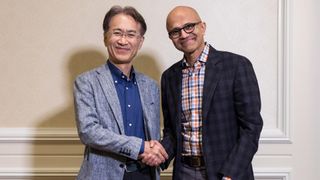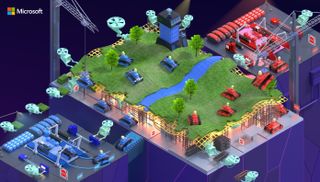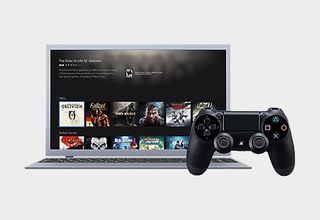What does Microsoft and Sony's ‘strategic partnership’ even mean?
The surprise move could mean anything—or nothing.

Microsoft and Sony announced yesterday the intent to develop a 'strategic partnership' together, sharing and collaborating on new cloud and AI tech, and respective game and content-streaming services. That's a whole lot of vague, corporate-speak, but both companies provide just enough information for us to wildly speculate on what such a partnership means for the future of PC gaming, and gaming in general, if it means anything at all this early on.
First, it's important to note that Microsoft and Sony haven't actually signed any legal paperwork, just a 'memorandum of understanding,' which is the formal alternative of a gentleman's agreement—a non-binding handshake. Sony and Microsoft have expressed interest in exploring a joint venture, but since they haven't actually committed to anything real on paper, they can back out at anytime. (Although that would be a breach of etiquette and would be quite rude, my dear sir.)
But, it does seem Microsoft and Sony have a lot to gain from a partnership with one another, even if the specifics of it are hazy at this time. What exactly do they have to gain? Let's break down the press release into a few pieces:

"The two companies will explore the use of current Microsoft Azure datacenter-based solutions for Sony's game and content-streaming services."
This seems like a slow setup to share technologies and resources to make the future of console gaming strictly a cloud-based one. Sure, digital purchases and downloads have been the norm for the last five years or so, but all our games are still downloaded directly to our PCs and consoles. The cloud, on the other hand, stores all those games on a remote server that we access from our PCs, and now possibly our consoles, too.
Microsoft announced back in March that it was bringing all its developer tools under a single wheelhouse, which includes Azure—itself the foundation for Project xCloud, Microsoft's first venture into game streaming on PC. Sony already has its own streaming service, PlayStation Now, which allows users to stream PS4 exclusives on their PC. In addition, Microsoft ditched the disc drive in the Xbox One S all-digital version (which Sony could potentially do with its PS5 as well, although nothing has been confirmed), and Sony has started porting some of its PlayStation exclusive games to PC, like Detroit: Become Human.
This could mean two things: one, removing the disc drives from consoles nearly turns them into streaming-boxes. Throw in a joint venture for more cloud gaming solutions for both companies and console games could fully go the way of the gaming cloud, like they are starting to with PC games. Two, if all PC and console games are stored/accessed via cloud, that means platform exclusivity loses nearly all of its meaning, especially under this kind of partnership.
The biggest gaming news, reviews and hardware deals
Keep up to date with the most important stories and the best deals, as picked by the PC Gamer team.

"The two companies will explore joint development of future cloud solutions in Microsoft Azure to support their respective game and content-streaming services."
It could also mean that Sony will be using Microsoft's Project xCloud technology for its PlayStation Now service. (Project xCloud is still in the early stages of development.) Since Sony already has its own business model and tech for its game streaming service, Microsoft could benefit in this area by partnering with Sony. It's also a lot cheaper and less time consuming to put a console-exclusive game on a cloud gaming platform than it is to port it over to PC.
Azure is part of Microsoft's robust game developer toolkit, which includes PlayFab, a complete backend platform for multiplayer games—and PlayFab supports all major devices, including PC, Xbox, and PlayStation, which could also be beneficial for Sony.
But like we've talked about before, it's so hard to imagine what the future of cloud gaming will look like, whether it's PC or console, because the technology is still in an early incubation phase. We've already talked to several developers about Google Stadia and what that could mean for the future of games. The same concerns can be applied to Project xCloud, PlayStation Now, or any other cloud gaming/development platform. Cloud gaming on PC has many issues still, too—issues that won't magically improve when cloud gaming on console. I don't expect Microsoft or Sony to ditch their digital storefronts any time soon, either, but I'm somewhat convinced they are teaming up to compete with Google to win the hearts of more PC gamers.

"Sony and Microsoft will also explore collaboration in the areas of semiconductors and AI."
This part is more vague than the rest, but I have one theory, even if it's a crazy one. Consumers are going to see some new stuff come to PlayStation VR and Microsoft HoloLens, maybe cross-platform compatibility between PlayStation VR and PC, even. If you saw Microsoft's talk at GDC 2019 about developing games for HoloLens, then you know sensors play an important role in VR/AR technology, and you also know that AI enables VR/AR to interact with the physical environment.
Maybe Microsoft and Sony will make their own VR theme park in the future, powered by small form-factor PCs that guests strap on like backpacks to easily move around the game area. Wait, Oculus recently went PC-less with its Quest VR headset. Maybe Microsoft and Sony want to try VR/AR cloud gaming? That's a grandiose theory, yes, but hey, go big or go home?
What does seem likely, at least in the immediate future, is that both companies could be working toward making more of their exclusive titles not just available via the cloud, but developed in the cloud, similar to what Google hopes to achieve with Stadia. That means the idea of 'porting' something to PC or console might no longer exist in a few years, and both PC and console gamers can enjoy games that were once exclusive to their respective platforms via Project xCloud and/or a revamped version of PlayStation Now.
Additionally, it takes a lot of time and money to create the next console generation every few years. Running everything via cloud servers could mitigate a lot of those costs and give time back to companies to pursue other projects. Both the Xbox and PlayStation have become more and more similar hardware-wise over the years, in a bid to not only compete with each other but also gaming desktop PCs. The PS5 will have an AMD 8-core Ryzen and an AMD Navi 20, with ray tracing capabilities. The next Xbox specs haven't been announced yet, but don't be surprised if the hardware ends up looking very similar to the PlayStation.
Microsoft and Sony will share more information when it's available, so we'll just have to be patient and see whatever it is they plan on doing.
Most Popular

